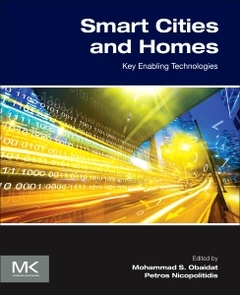Description
Smart Cities and Homes
Key Enabling Technologies
Authors: Obaidat Mohammad S, Nicopolitidis Petros
Language: English
Subjects for Smart Cities and Homes:
Keywords
3GPPP LTE; 5G; 802.11ax; access technologies; advanced metering infrastructure; applications; big data; bike sharing; car sharing; cloud computing; clustering; context-based service discovery; cyberattacks; cybersecurity; data analytics; dba; demand pattern; electricity-pricing manipulation; energy-aware coverage optimization; forecasting survey; green mobility; guest count prediction; handover; heterogeneous vehicular networks; ICT; incentivisation scheme; Information and Communication Technology; intelligent transportation systems; Intervehicle Communication; IoT; IVC; local indicator of spatial association; LTE-A; mDNS; MIMO; mobility; multimodal journey planning; net metering; optical access networks; optimization classification; panda; partially observable Markov decision process; power saving; quality of service; reliable transportation; renewable energy; restaurant sales forecasting; revenue management; risk-averse planning; routing; security; self-aware networks; self-controlled networks; self-organized networks; service description; simulation tools for smart grid; single event detection; smart cities; smart city; smart economy; smart governance; smart grid optimization; smart home; smart home scheduling; smart homes; smart mobility; smart technologies; software defined network; software-defined networking (SDN); strategic design; traffic prediction; transportation systems; uncertainty; vehicle operational repositioning; vehicle-sharing system; vehicular cloud; vehicular networks; virtualization; Wireless Local Area Networks; wireless sensor network; WSN; xg-pon; yield management
88.31 €
In Print (Delivery period: 14 days).
Add to cartSupport: Print on demand
Description
/li>Contents
/li>Biography
/li>Comment
/li>
Smart Cities and Homes: Key Enabling Technologies explores the fundamental principles and concepts of the key enabling technologies for smart cities and homes, disseminating the latest research and development efforts in the field through the use of numerous case studies and examples.
Smart cities use digital technologies embedded across all their functions to enhance the wellbeing of citizens. Cities that utilize these technologies report enhancements in power efficiency, water use, traffic congestion, environmental protection, pollution reduction, senior citizens care, public safety and security, literacy rates, and more.
This book brings together the most important breakthroughs and advances in a coherent fashion, highlighting the interconnections between the works in different areas of computing, exploring both new and emerging computer networking systems and other computing technologies, such as wireless sensor networks, vehicle ad hoc networks, smart girds, cloud computing, and data analytics and their roles in creating environmentally friendly, secure, and prosperous cities and homes.
Intended for researchers and practitioners, the book discusses the pervasive and cooperative computing technologies that will perform a central role for handling the challenges of urbanization and demographic change.
1. Preface2. Introduction and Overview of Key Enabling Technologies2. Wireless Sensor Networks3. Internet of Things4. Worldwide Interoperability for Microwave Access Systems (WiMAX)5. Wireless Local Area Networks6. Personal Area Networks7. LTE and 5G Systems8. Optical Networks9. Vehicle Ad Hoc Networks10. Social Networks11. Biometric Systems12. GPS and GIS Systems13. Cloud Computing Systems14. Smart Transportation Systems15. Smart Girds16. E-Based Systems: e-Commerce, e-Government, e-Business and e-Service Systems17. Smart Homes for Senior/Elderly Citizens18. Pollution Control in Smart Cities19. Privacy and Security in Smart Cities and Homes20. Data Analytics and Smart Cities and Homes21. Trends and Challenges in Smart Cities and Homes
Petros Nicopolitidis is an Assistant Professor in the Department of Informatics at Aristotle University of Thessaloniki,located in Thessaloniki, Greece.
- Includes case studies and contributions from prominent researchers and practitioners from around the globe
- Explores the latest methodologies, theories, tools, applications, trends, challenges, and strategies needed to build smart cities and homes from the bottom up
- Provides a pedagogy that includes PowerPoint slides, key terms, and a comprehensive bibliography




